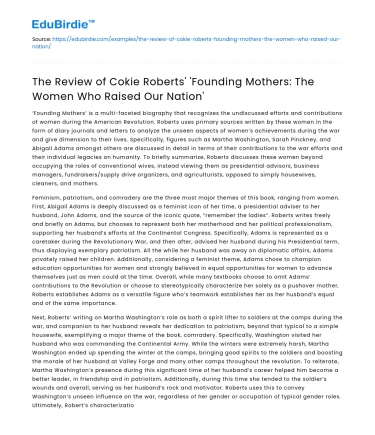‘Founding Mothers’ is a multi-faceted biography that recognizes the undiscussed efforts and contributions of women during the American Revolution. Roberts uses primary sources written by these women in the form of diary journals and letters to analyze the unseen aspects of women’s achievements during the war and give dimension to their lives. Specifically, figures such as Martha Washington, Sarah Pinckney, and Abigail Adams amongst others are discussed in detail in terms of their contributions to the war efforts and their individual legacies on humanity. To briefly summarize, Roberts discusses these women beyond occupying the roles of conventional wives, instead viewing them as presidential advisors, business managers, fundraisers/supply drive organizers, and agriculturists, opposed to simply housewives, cleaners, and mothers.
Feminism, patriotism, and comradery are the three most major themes of this book, ranging from women. First, Abigail Adams is deeply discussed as a feminist icon of her time, a presidential adviser to her husband, John Adams, and the source of the iconic quote, “remember the ladies”. Roberts writes freely and briefly on Adams, but chooses to represent both her motherhood and her political professionalism, supporting her husband’s efforts at the Continental Congress. Specifically, Adams is represented as a caretaker during the Revolutionary War, and then after, advised her husband during his Presidential term, thus displaying exemplary patriotism. All the while her husband was away on diplomatic affairs, Adams privately raised her children. Additionally, considering a feminist theme, Adams chose to champion education opportunities for women and strongly believed in equal opportunities for women to advance themselves just as men could at the time. Overall, while many textbooks choose to omit Adams’ contributions to the Revolution or choose to stereotypically characterize her solely as a pushover mother, Roberts establishes Adams as a versatile figure who’s teamwork establishes her as her husband’s equal and of the same importance.
Save your time!
We can take care of your essay
- Proper editing and formatting
- Free revision, title page, and bibliography
- Flexible prices and money-back guarantee
Next, Roberts’ writing on Martha Washington’s role as both a spirit lifter to soldiers at the camps during the war, and companion to her husband reveals her dedication to patriotism, beyond that typical to a simple housewife, exemplifying a major theme of the book, comradery. Specifically, Washington visited her husband who was commanding the Continental Army. While the winters were extremely harsh, Martha Washington ended up spending the winter at the camps, bringing good spirits to the soldiers and boosting the morale of her husband at Valley Forge and many other camps throughout the revolution. To reiterate, Martha Washington’s presence during this significant time of her husband’s career helped him become a better leader, in friendship and in patriotism. Additionally, during this time she tended to the soldier’s wounds and overall, serving as her husband’s rock and motivator. Roberts uses this to convey Washington’s unseen influence on the war, regardless of her gender or occupation of typical gender roles. Ultimately, Robert’s characterization of Mary Washington proves that through her actions, she herself was equally as determined to the development of this country as her husband.
Roberts’ writing is disappointing stylistically, as she tends to leap from figure to figure without clear transition, which often leaves her audience confused and unable to follow her thought process. Further, Robert’s frequent lack of structure and organization within her writing makes for a directionless piece of literature. Additionally, many could argue that Roberts writes in a manner that is both dry and uninteresting to a variety of readers, and similarly in conjunction with the book’s length, does not maintain many reader’s attention spans. For example, Roberts does not typically include facts about these women that would be perceived as interesting to a wide spectrum of audiences (Roberts could have included less archaic interests of these women that younger generations could identify with).
In terms of content, Roberts’ writing can appear cliché, as it identifies with conventional motifs, such as the idea that a woman is and should be a man’s support system. An example of this is evident in the way she chooses to portray the relationship between Benjamin Franklin and his estranged wife, Deborah Read Franklin. In depth, Roberts characterizes Deborah Read Franklin as the neglected housewife who remains subservient to her husband’s affairs despite his lack of presence in their marriage. To then add, Robert’s inclusion of her role in defending her household from throngs of irate protesters as a result of the Stamp Act in her husband’s absence characterizes her in the same accommodating manner. This concept of false loyalty within unhealthy romantic relationships within a book supposedly intended to empower women may vex those who seek a text more heavily rooted in feminist affairs.
However, Roberts’ research is both extensively done and supports her purpose accordingly, regardless of her apparent organizational issues. Further, she is able to write credibly on a variety of women’s lives throughout the American Revolutionary period ranging from high profile presidential First Ladies such as Dolly Madison, Martha Washington and Abigail Adams, to lesser known figures, such as Esther Reedwho organized and accumulated hundreds of thousands of dollars in support of the American troops. Crucially, Roberts even included women of color such as Phyllis Wheatley who coexisted in times of slavery, but used her skill and raw talent to attract the attention of President George Washington.
Overall, her research and information appears considerate to women of many walks of life, however her writing itself lacks overall structure and organization, and can be perceived as having anti-feminist gender roles at times. For those specific reasons, this book should not be recommended to readers.






 Stuck on your essay?
Stuck on your essay?

